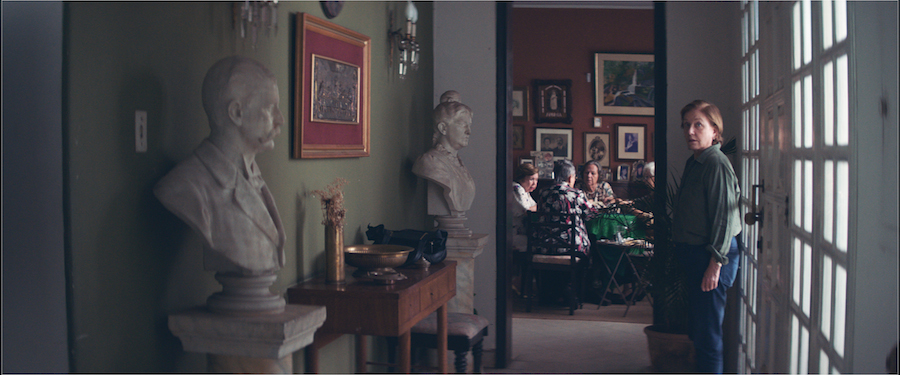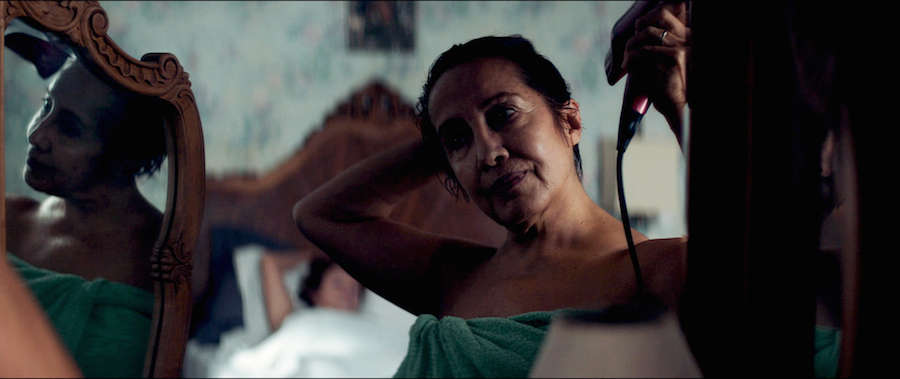Review: Interview Marcelo Martinessi (Las Herederas)
Interview Marcelo Martinessi (Las Herederas)
Unmistakably Paraguay in universal film
The Latin American-European co-production ‘Las herederas’ is the first full-length film by the Paraguayan Marcelo Martinessi. This summer, the subtle drama about two middle-aged female lovers won several awards, including the Silver Bear for best actress (for debuting actress Ana Brun) in Berlin and the Jury Award at World Cinema Amsterdam. Director and scriptwriter Marcelo Martinessi (1973, Paraguay) was in Amsterdam to receive his prize.
Asuncion, Paraguay. Chela and Chiquita, from affluent families, have been together for over thirty years. Over the years, they’ve developed a set division of roles: extroverted Chiquita is responsible for running their lives. Chela, on the other hand, spends the day behind her easel. Their financial situation forces them to sell their beloved inherited furniture. When Chiquita is sent to prison for fraud, Chela is suddenly left alone. She starts a taxi service for the rich, older ladies in the area. Her new role as a chauffeur draws the passive Chela out of her shell and helps rediscover her desires.
Marcelo Martinessia
In interviews I read that you often work with a small crew, of people you have known for a long time. Was that also the case with ‘Las Herederas’?
“The crew was small and indeed I have known my art director and head of photography for ten years. Paraguay doesn’t have a big film industry, so you’ll soon be working with people you know. I wanted to have the time, forty days to shoot, because I wanted to feel comfortable and safe with my first feature film. Also for Ana Brun (Chela) it was her first film – she only had some stage experience from long ago. Margarita Irun (Chiquita) is very experienced as a stage actress, but even for her filming was still new. And the older ladies were all newcomers to the movie world.”
It will not be a coincidence that the film only has female characters. Where did this choice come from?
“Would we be talking about that too if I had chosen an all-male cast? I wonder. But I was also surprised myself that an all-female cast unfolded during the writing. It may have to do with the fact that I am more comfortable directing women. It’s what I know: I grew up surrounded by women: mother, grandmother, four sisters, great-aunts, neighbours. I also wanted to ask questions with this film. And I remembered that as a boy growing up I always had to have all the answers. My sisters may have doubts, but I am not. So I knew: if I want to ask questions with my film, I’ll have to do it through women. Finally, I see Paraguay as a country of women: after conflicts and wars, the women have built the country over and over again. So the choice also does justice to that history.”
Chela, the main character, is a withdrawn, middle-aged lesbian woman who rediscovers her sensuality and zest for life. How did you come up with such an unconventional character?
“That premise was there from the start. The film was supposed to be about women, a couple who lived in a kind of captivity. At first I thought about sisters, but later I decided it was a couple; somewhere between lovers and sisters. Later in the writing process I considered focusing on a straight couple, but all kinds of other considerations would play a role: then it would have to be about gender and violence and that would change too much of the story I wanted to tell.”
You call it prison. The real prison in which Chiquita ends up and the symbolic prison in which the two women are at home. What did you mean by that?
“I was mainly concerned with Chela: the film was supposed to be about a woman who is trapped in a relationship, trapped in a social class, and suddenly, when her partner ends up in a real prison, slowly starts to be ‘free’.”
Chela seems stuck not only in her relationship and social class, but also in her legacy of the past: an old house, full of belongings from previous generations.
“The most important thing is what they inherit from the past: also prejudices, restrictions, boundaries that have been imposed on them, which prevent them from being free. Our art director Carlo Spatuzza has decorated the house from the film exactly as he wanted: furniture, bedding, kitchenware, art, to the taste of this type of women: everything you can buy in Paraguay now comes from China. But the stuff these women have in their house is of a higher quality: from England, France. Solid wood, expensive paintings, a classical piano. We spent a lot of our small budget on that.”

Isn’t it fraught, because the past also links to Paraguay’s conflicted history?
“As a country, we deal with the past in a strange way. We only use part of our inheritance. Only those of recent history. While the legacy of Paraguay’s original inhabitants, the Guaraní, their way of seeing the world, is totally ignored. Hence the title ‘Las Herederas’ (‘the heirs’), because it has so many layers of meaning. In a certain scene we see that Chela also carries pride in her legacy, her history. There she puts the nouveau riche, a class that threatens her, on their number. That’s how she keeps her pride. That’s why it’s one of my favorite scenes from the movie.”
Is that battle between ‘old money’ and ‘new money’ important in the film?
“Of course. During the military dictatorship of Paraguay (from 1954 to 1989, under General Stroessner, ed.) power partly shifted from the traditional elite to ‘new money’ families, linked to bad taste, crime and drug trafficking. This has happened in many Latin American societies. The old elite lost a lot of money during and after the dictatorship, so they tended to put more emphasis on their past. They wanted to hold on to their old privileges. That is why the role of the domestic help is so important.”
Explain?
“That may be difficult to understand from a European perspective, but domestic help is one of the last privileges of that traditional upper class. He would rather sell the expensive crockery than fire the help. In the film, the two women also talk about this: ‘the old help was better’, they say, than the new one, Pati. Probably because the previous help was more expensive, and they now have the cheapest they could find. This is not obvious, but it is in the film, to give an impression of how a society works. I started this script because I wanted to understand the traditional upper class. I don’t want to explain too much, I like these kinds of subtle clues.”
Opposite Pati is neighbor Pituca, who is the first to ‘hire’ Chela for a ride. Is she an archetypal upper-class gossiper?
“She looks a lot like my great-aunt. It was even called that. I was still afraid that my great-aunt’s family would take it the wrong way, but everyone was happy with the tribute. Fortunately, the character of Pituca remained witty and full of self-mockery, thanks in part to the actress who plays her, a good friend of Ana Brun. As a result, their interaction was very natural.”
How was the film received in Paraguay and elsewhere?
“This was one of the few ‘big’ movies from Paraguay in recent years. We would even receive an award from the Senate. But when it became known there that it was about two lesbian women, and we came to visit, half of the conservative senators walked away. One of them even started yelling at Ana Brun, “You lesbi, get out of here!” This shows how far the politicians are lagging behind the population. The recently-appointed president is the son of an old secretary to dictator Stroessner. Very sad, that shows how conservative politics is. But the film was received very positively by the people themselves, and also by the press. In our own country, but also here, in Germany and England. The film is very Paraguayan, yet universal. We’ve made certain typically national elements of the script less important; like the exact reason why Chiquita ends up in jail. It was difficult for some European lenders to understand that the prison they end up in is such a positive place. But it’s based on a real prison, wherever I’ve been. And so it really was there. This is because people are – paradoxically – more free there. Broken out of their straitjacket.”
The two women from the film also break out of their straitjacket? And then suddenly end up in the here and now?
“I think so. The women come alive. Chela wasn’t alive at first. That symbolizes my country, which was also ‘dead’ for a long time. Paraguay has had one of the longest dictatorships in the world: for 35 years we were weighed down by a dictator who told us what to do. There was a relationship between the dictator and the petty bourgeoisie that allowed it to last so long. He also maintained privileges. When he finally left, he left society alone. People didn’t know what to do, they were suddenly on their own. That didn’t go well. This was also because the system was maintained in many institutions. Not everyone will understand this layer of meaning, but it is recognizable for many countries where similar themes play a role. And you can see, then I wrote out all kinds of other political layers!”

Very little is known about Paraguay in Europe. Why is that do you think? And can a film like this contribute positively to the image?
“It is partly a strategy for our own government; to stay under the radar, not being held accountable. We as filmmakers can act as ambassadors, but I don’t want to take too much responsibility. I can’t represent the whole country. But it is a nice idea that a work of art, a film, can give a different picture of an unknown country. And of Latin America in general: about which there are still many prejudices. A film that has absolutely nothing to do with drugs, violence or football! haha.”
The ending is quite surprising. How did that come about?
“I had a different ending in mind for a long time, much more pessimistic. Because I also looked at the situation in Paraguay very pessimistically at the time. Still, I decided to open the door a little, because I thought it was unfair to Chela to keep her ‘captive’. Now she’s got a chance. In any case, loose ends were allowed to remain, about which the viewer may still have questions.”
Ruby Sanders

Comments are closed.